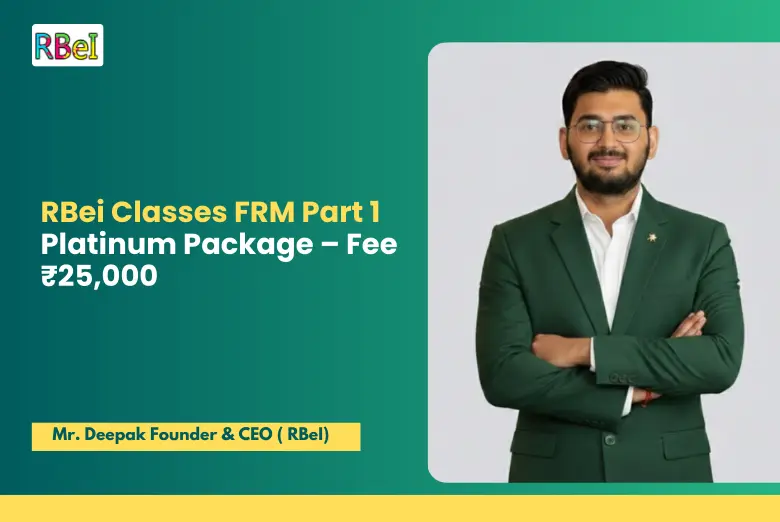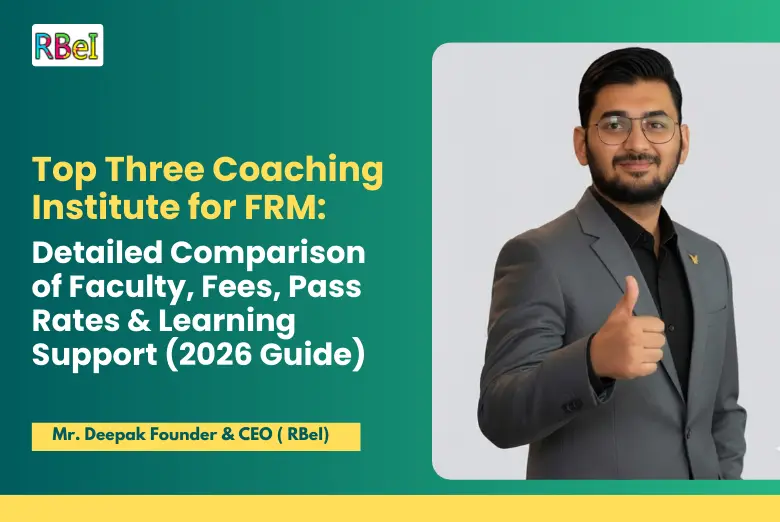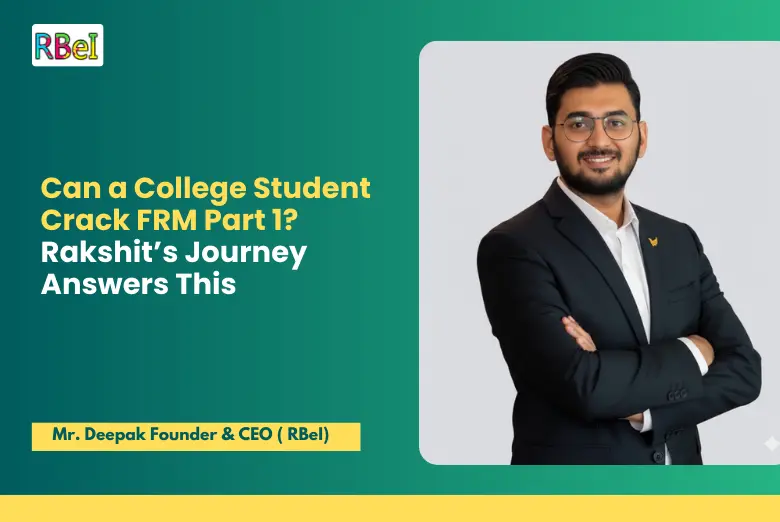If you’re pursuing an MBA and still wondering how to boost your career and job prospects, then combining it with the CFA course might be the smartest decision you’ll ever make. I pursued CFA along with my MBA from a tier-2 college in Pune, and today, I have a 22 LPA job, handling high-level meetings with CEOs and CFOs of listed companies in India. In this blog, I’ll share how I cracked CFA Level 2 in just one year, how I managed my time, why I chose RBei Classes for CFA coaching in Mumbai, and how it completely changed my career trajectory.
Table of Contents
ToggleWhy I Chose CFA Along With MBA – The Deadly Combination
When I started my MBA, I was clear that I didn’t want to settle for just another average campus placement. A senior at college suggested I pursue the CFA course, and I started researching everything about it—career opportunities, salary growth, global recognition, and more. It was immediately clear to me that CFA + MBA is a deadly combination, especially for anyone who wants to make a serious impact in Investment Banking, Equity Research, Portfolio Management, or even FinTech. The CFA curriculum’s depth helped me understand real-world finance, while MBA sharpened my soft skills and networking. This synergy gave me an edge during job interviews and ultimately helped me land a role that pays me 22 LPA.


How I Managed CFA with a Full-Time MBA
Let’s be honest—preparing for CFA along with a demanding MBA schedule isn’t easy. Between lectures, group projects, and internships, there’s barely any time left. But here’s how I made it work:
- I used CFA recorded lectures from RBei Classes to study late at night and early mornings.
- I dedicated weekends to CFA mock exams and revision sessions.
- Instead of wasting time scrolling through social media, I made short study slots throughout the day—even during commute breaks!
- The personalized mentorship from Deepak Sir kept me motivated. He used to follow up with my weekly progress and even helped tweak my study plan during exam stress.
This strategy helped me clear CFA Level 1 and Level 2 in one year, something most people struggle with even while working full-time.

Why I Picked RBei Classes Over Other CFA Coaching Institutes
Honestly, there were many CFA coaching options available, both offline and online. But after attending a few demo lectures, I realized that RBei Classes was different. Here’s why I picked them and why I still recommend them:
1. Best CFA Preparation Material
The study material was crisp, well-structured, and directly aligned with the CFA exam pattern. Every topic was simplified with real-life examples.
2. Detailed Lectures That Made Concepts Crystal Clear
Unlike boring classroom monologues, Deepak Sir’s lectures felt like storytelling sessions. Concepts like derivatives and portfolio management, which seemed intimidating, became my strong areas.
3. CFA Recorded Lectures – A Lifesaver for Busy Students
Being a full-time MBA student, I couldn’t attend live classes regularly. The recorded lectures gave me complete flexibility to learn at my own pace, revise topics, and rewatch tricky concepts anytime.
4. Difficult CFA Mock Exams That Simulated Real Exam Pressure
The mock exams were tougher than the actual CFA paper, and that’s what helped me stay ahead. I didn’t just prepare to pass—I prepared to score.
5. Personalized Mentorship & Career Guidance
What truly sets RBei apart is the 1-on-1 mentorship from Deepak Sir. He not only taught but also mentored me on career choices, resume building, and even helped me crack my final interviews.

How My Career Changed After CFA
Before CFA, I was just another MBA candidate trying to get shortlisted. After CFA, I was on the radar of top financial recruiters. Today, I’m:

Deepak Goyal CFA & FRM
Founder & CEO of RBei Classes
- 16,000+ Students Trained in CFA, FRM, Investment Banking & Financial Modelling
- 95% Students Successfully Placed • 94.6% Pass Rate In Exam
- Handling real-time financial modeling and equity research projects
- Attending board-level meetings and preparing pitch books for M&A deals
- Collaborating with CFOs, CEOs, and senior decision-makers
- Working in a role that pays me 22 LPA, with global opportunities knocking at my door
CFA gave me the knowledge, credibility, and global recognition to stand out, even coming from a tier-2 college.
Career Opportunities After CFA in India – What You Can Expect
Here’s what you can expect after completing your CFA course in India:
- Investment Banking Roles
- Equity & Credit Research
- Portfolio & Asset Management
- Risk Management & Valuations
- Fintech & ESG Finance
And if you’re from a non-finance background, this certification is your golden gateway.
Why RBei Classes Has the Highest Pass Rate for CFA in India
With a 94% pass rate, RBei Classes is India’s most successful CFA coaching institute. They offer:
Best CFA Coaching in Mumbai
Detailed CFA Preparation Material
Toughest CFA Mock Exams
Personalized Doubt Sessions
Free Technical Courses (Python, SQL, Excel)
Lifetime Access to Recorded Lectures
Complete Placement Support
Their complete ecosystem of learning, mentorship, and career grooming is unmatched.
Final Words – My Message to Aspiring CFA Candidates
If you’re pursuing your MBA, or even if you’re a working professional aiming to switch to core finance, CFA is your key to transformation. My only advice: choose your coaching partner wisely. For me, it was RBei Classes that made all the difference—from preparation to placement.
Don’t wait for the right time. Start your CFA journey now, and you’ll thank yourself a year later.
1. What is the eligibility criteria for the CFA course?
To enroll in the CFA course, candidates must meet the following eligibility requirements:
- Education: You must have either completed your bachelor’s degree or be in the final year of your undergraduate program. Alternatively, candidates with a combination of 4,000 hours of professional work experience (or higher education) can also apply.
- Age: You must be 18 years or older at the time of registration.
- English Proficiency: All CFA exams are conducted in English, so a strong command over the language is essential.
Many candidates start preparing for CFA Level 1 during their graduation or MBA, which helps them complete all three levels by the time they gain relevant work experience.
2. When are the CFA exam dates in 2025?
The CFA exams are conducted multiple times a year for each level. Below are the tentative CFA exam windows for 2025:
CFA Level 1 Exam Dates 2025
| February 17 – March 2 |
| May 15 – May 31 |
| August 21 – September 6 |
| November 18 – December 3 |
Level II Exam Dates 2025
| May 22 – May 29 |
| August 27 – September 3 |
| November 20 – November 26 |
Level III Exam Dates 2025
| February 24 – March 3 |
| August 19 – August 25 |
You must register 6–9 months in advance to get your preferred exam window and location.
3. What is the syllabus of the CFA course in 2025?
The CFA syllabus is divided into three levels, each progressively advanced. Below is a summary:
CFA Level 1 – Foundation of Finance
- Quantitative Methods
- Financial Reporting and Analysis
- Ethics & Professional Standards
- Economics
- Corporate Issuers
- Equity Investments
- Fixed Income
- Derivatives
- Alternative Investments
- Portfolio Management
Level 2 – Application of Tools
- Deeper understanding of valuation, financial modeling, and investment decision-making
- Real-world scenarios and case-study-based questions
Level 3 – Portfolio Management
- Wealth Planning
- Asset Allocation Strategies
- Behavioral Finance
- Ethics and GIPS
The Best CFA Preparation Material from top coaching institutes like RBei Classes is aligned with the CFA Institute curriculum and updated annually.
4. What is the total cost or exam fee for the CFA course?
The CFA exam fees vary depending on when you register. Below is a breakdown of the cost as of 2025:
| Fee Type | Amount |
| Enrollment Fee (one-time) | USD $350 |
| Early Registration Fee (per level) | USD $940 |
| Standard Registration Fee (per level) | USD $1,250 |
So, the total cost for all three levels can range from USD $3,170 to $4,100, depending on your registration timeline. In INR, this roughly comes to ₹2.75 to ₹3.5 Lakhs.
Pro Tip: Enroll early and use CFA Coaching in Mumbai like RBei Classes to maximize your ROI.
5. What are the job opportunities after completing the CFA course in India?
After completing the CFA course in India, candidates can unlock a wide variety of high-paying finance roles, such as:
- Equity Research Analyst
- Investment Banking Associate
- Portfolio Manager
- Risk Manager
- Valuation Analyst
- Financial Modelling Expert
- Wealth Manager
- Private Equity Analyst
- ESG Finance Specialist
Top recruiters include Big 4 Consulting Firms, MNC Banks, Asset Management Companies, and FinTech Startups. According to data from RBei Classes, candidates who clear CFA Level 2 or Level 3 along with MBA or CA often receive offers ranging from ₹10 LPA to ₹30 LPA.






